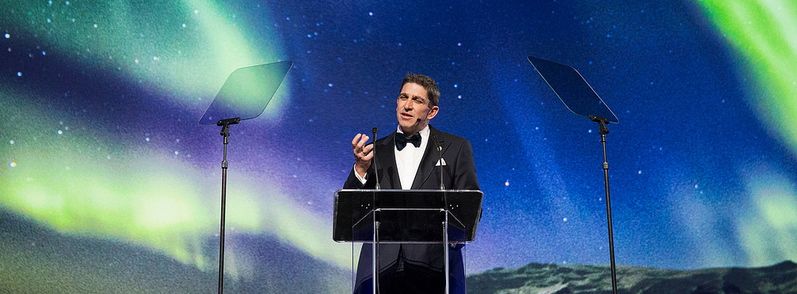
Genius of stars and love
“It’s a privilege to live in a community that both wants to, and believes it can, change the world.” – Tim Ritchie president of the The Tech during the Tech Awards presentation.
********
By now you’ve heard that Richard Blanco “was made in Cuba, assembled in Spain, and imported to the United States.” And you probably know that at 44, Blanco became the youngest-ever inaugural poet and the first Hispanic and gay individual to recite a poem at the presidential swearing-in ceremony.
Last week Blanco crossed another barrier by creatively merging the lines of technology and art during his appearance at the Tech Awards held at the Santa Clara Convention Center in Silicon Valley, California. The Awards has become a leading awards program, presented by Applied Materials, that recognizes inventors and entrepreneurs whose work is intended to unleash the potential of technological innovation into solutions for a better world.
And Blanco was invited to recite a poem he wrote especially for that evening titled, Genius of Stars and Love. People wondered and many asked, “How do you mix poetry with technology?” Blanco made it happen by emphasizing that “love is our wisest formula … our most noble science, most brilliant invention.”
What follows is the Richard Blanco poem on the occasion of The Tech Awards 2013:
Genius of Stars and Love
The tiny billion eyes of the stars have seen it all.
 They’ve watched us as long as we’ve stared up
They’ve watched us as long as we’ve stared up
at them, their twinkle whispering in our eyes, eons
before our tongues tamed breaths into words
that could name them, chart and connect them
in the likeness of our heroes, gods, and beasts.
They knew our minds would dare kindle fire: fire
to cook, to draw and write with soot, fire to reach
the moon someday, then aim toward their sparkle.
They knew once they heard the first tree we felled
and hollowed into a hull, cutting across the mirror
of a lake to a far shore—simply because there was
a farther shore. They held our hands stitching sails
to cup wind across seas, glide over the flat earth
before it was round to us. They knew, following us
as we followed them for centuries to map our world
in pastel colors, then stitch continents with tracks,
roads veining over the land. They knew we’d solve
the mystery of bones and feathers to forge steel
into wings for ourselves, kiln sand into glass to peer
at our cells dividing, atoms spinning, and the heart
of their starriness breathing like our own bodies.
They saw us speak with smoke, then dots-dashes—
now they eavesdrop on our voices, pixels made air
traveling at the speed of light through our satellites
like fireflies flashing beside them in the nightsky. Sky
from which they’ve also mourned our wars, pitied
our crisp air turned heavy and dark, our reflections
drowned in rivers and lakes spoiled by our spoils,
our land stripped barren by drought and flood.
They knew. But they waited, hoping someday
we’d understand what we’re understanding now:
it takes the soul’s mind as much as the gears
of love if we are to survive ourselves and reach
their starlight someday. Love to graph the arc
of a child’s smile tasting fresh water, tasting
a fresh tomorrow. Love to design an arm of steel
for an armless man, measure the joy in his eyes
able to touch his wife’s face. Love to calculate
what we took, must return to the earth to sow
the seeds of a farmer’s trust. Love to integrate
all the voices of the voiceless into the gigabytes
of words claiming the world. Love to harness
light to give life and save lives, the same light
from the stars that have always known: love
is our wisest formula, most elegant calculation,
our most noble science, most brilliant invention.
Love, our greatest genius, as genius as the fire
in the still eyes of the stars, still watching us.
(Photographs and video courtesy of the Tech Awards)


